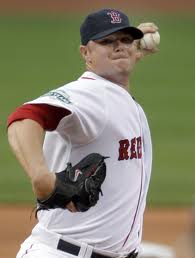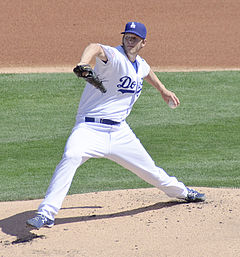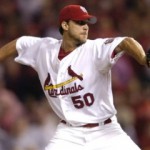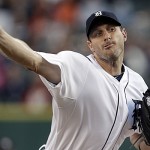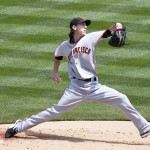(Editor’s Note: sorry for the tardiness on this post: I had it completely written and a WordPress or browser glitch lost 1,000 words of analysis. So it took a bit of time to cobble back together what I had originally written. Then the Souza trade hit, then the Cuban thing … and this got pushed).
What a GM Meeting week! As one of the Fangraphs guys noted, there were so many transactions, so fast, that he literally gave up trying to write individual analysis pieces and went to a running diary of sorts. I was amazed at the number of significant deals and trades made, especially when it came to starters. So lets take a look at who shook things up.
Many teams are making big moves (almost the entirety of the the AL it seems) to try to win in 2015. And many teams have revamped their rotations. First, here’s a quick run through teams that have made significant acquisitions to their starting rotations (using BP’s Depth Charts page, Fangraphs stats pages and BaseballProspectus‘ page for injury history, Cots at BP for salaries, and of course baseball-reference.com).
Teams who have Improved
- Chicago White Sox: acquired Jeff Samardzija in Oakland’s fire sale to go with established ace Chris Sale, the highly underrated Jose Quintana. From there the White Sox have question marks: John Danks is just an innings eater at this point and Hector Noesi was not effective in 2014. But the White Sox have one of the brightest SP prospects in the game at AAA in Carlos Rodon (their fast-rising 2014 1st round pick) and their former #1 prospect Erik Johnson (who struggled in his debut in 2014 but has a good minor league track record). So by the latter part of 2015 the White Sox could be a scary team for opposing offenses to face.
- Minnesota: just signed Ervin Santana to join a rotation containing the rejuvinated Phil Hughes, the decent Ricky Nolasco and first rounder Kyle Gibson. If they (finally) call up former Nats 1st rounder Alex Meyer to fill out the rotation and replace the dregs that gave them #4 and #5 rotation spot starts last year, they could be significantly improved. Of course, the problem they face is the fact that they’re already playing catchup in the AL Central and still look like a 5th place team in this division.
- Los Angeles Angels: adroitly turned one year of Howie Kendrick into six years of Andrew Heaney, who should thrive in the big AL West parks. If the Angels get a healthy Garrett Richards back to go along with the surprising Matt Shoemaker, they may have a surplus of decent arms being stalwards Jered Weaver and C.J. Wilson.
- Miami has spent some cash this off-season, but they’ve also gone shopping and upgraded their rotation significantly. After acquiring the decent Jarred Cosart at the trade deadline, they’ve flipped bit-players to acquire Mat Latos, added Dan Haren and a $10M check while parting ways with the
unprovenyoungster Andrew Heaney, and should get ace Jose Fernandez back by June 1st if all goes well with his TJ rehab. Add to that Henderson Alvarez and the Marlins look frisky (their new-found depth enabled them to move Nathan Eovaldi to the Yankees). Rumors are that Haren won’t pitch unless he’s in SoCal, but $10M is an awful lot of money to turn up your nose at. This is an improved rotation no doubt, and the rest of the Marlins lineup looks good too. - New York Mets get Matt Harvey back. Enough said. Harvey-Jacob deGrom is one heck of a 1-2 punch.
- Chicago Cubs: added an ace in Jon Lester, re-signed their own effective starter in Jason Hammel, and will add these two guys to the resurgent Jake Arrieta. Past that you have question marks: Kyle Hendricks looked great in 2014. And the Cubs gave nearly 60 starts last year to Travis Wood (5+ ERA) and former Nat Edwin Jackson (6+ ERA). I could envision another SP acquisition here and the relegation of Wood & Jackson to the bullpen/AAA/scrap heap.
- Pittsburgh was able to resign Francisco Liriano and get A.J. Burnett for an under-market deal. This should keep them afloat if they end up losing Edinson Volquez in free agency. Otherwise they have decent back of the rotation guys and will get back Jamison Taillon perhaps in the early part of the year. This could help them get back to the playoffs with the anticipated step-back of NL Central rivals Cincinnati.
- Los Angeles Dodgers said good bye to a stable of starters (Josh Beckett, Chad Billingsly, Kevin Correia, Dan Haren, Roberto Hernandez and Paul Maholm are all either FAs or have been traded away) and signed a couple of guys to go behind their big three of Kershaw, Greinke and Ryu who could quietly make a difference (Brandon McCarthy and Brett Anderson) if they remain healthy. That’s a bigger “if” on Anderson than McCarthy, who excelled once leaving the circus that Arizona was last year before the management house cleaning and should continue to excel in the huge park in LA. Were I Andrew Friedman, I’d re-sign at least a couple of these FA guys for 5th starter insurance … but then again, the Dodgers also have a whole slew of arms in AAA that could be their 5th starter. Or they could just open up their wallets again; there’s still arms to be had. Nonetheless, replacing 32 Haren starts with McCarthy will bring immediate benefits, and whoever they end up with as a 5th starter has to be better than the production they got last year out of that spot.
Team most improved: likely the Cubs.
What teams’ rotations have taken step backs or are question marks heading into 2015?
- Boston: after trading away most of their veteran rotation last season, the Red Sox seem set to go into 2015 with this rotation: Clay Buchholz, Rick Porcello, Justin Masterson, Joe Kelly and Wade Miley. This rotation doesn’t look as good as it could be; Buchholz was awful in 2014, Porcello is good but not great, Masterson the same, Kelly seems like a swingman, and Miley has back to back 3.98 FIP seasons in the NL and will see some ERA inflation in the AL (though not as much as normal since Arizona is a hitter’s park). But Boston’s entire AAA rotation are among their top 10 prospects, so there’s plenty of depth they could use in trade or as reinforcements.
- Detroit: Arguable if they’ve really taken a “step back,” but you have to question their direction. In the last two off-seasons they’ve traded away Doug Fister, Rick Porcello, Drew Smyly, prospect Robbie Ray and have (seemingly) lost Max Scherzer to free agency so that they can go into 2015 with this rotation: David Price, Justin Verlander, Anibel Sanchez, Alfredo Simon and Shane Greene. Is this a winning rotation for 2015?
- Kansas City: They have replaced departing free agent ace James Shields with newly signed Edinson Volquez, keeping newly acquired Brian Flynn and 2014 draft darling Brandon Finnegan in the bullpen for now. KC is going to take a step back and will struggle to compete in the new super-powered AL Central in 2015, but have a slew of 1st round arms that look like they’ll hit in late 2015/early 2016. I do like their under-the-radar signing of Kris Medlen though; he could be a very solid addition to their rotation if he comes back from his 2nd TJ.
- Oakland will have a new look in 2015, having traded away a number of core players. But their rotation should be OK despite having traded away Samardzija and let Jon Lester and Jason Hammel walk. Why? Because they stand to get back two very good rotation members who missed all of 2014 with TJ surgery in A.J. Griffin and Jarrod Parker. They should re-join the 2014 rotation members Sonny Grey, Scott Kazmir, newly acquired Jesse Hahn and either Jesse Chavez/Drew Pomeranz to form another underrated rotation. Of course, if these guys have injury setbacks, it could be a long season in Oakland.
- Texas made a couple of acquisitions, re-signing their own Colby Lewis and trading for Nats cast-off Ross Detwiler (who should fit in immediately as their 4th starter), to go with ace Yu Darvish and recently recovered Derek Holland. But Texas could significantly improve come mid-season when injured starter Martin Perez should return. The big question mark for Texas is Matt Harrison, who had to have two vertebrae in his back fused and may not return, ever. But if Harrison can come back, that gives Texas an opening day 1-5 that’s pretty improved over last year.
- Cleveland didn’t exactly have the world’s best rotation in 2014 but has done little to improve it going forward. They will continue to depend on Corey Kluber, newly minted Cy Young winner to head the line, but then its question marks. Carlos Carrasco was great in a combo role in 2014; where’d that come from? He was awful in years prior. Is Trevor Bauer dependable? They better hope so; that’s your #3 starter. They just signed Gavin Floyd after his injury shortened 9-game stint with Atlanta last year; he’s no better than a 4th/5th innings eater. Is Gavin Salazar ready for prime time? He wasn’t in 2014. And there’s little else on the farm; the Indians don’t have a significant starting pitcher prospect in their entire system.
- Atlanta: The Braves surprisingly parted ways with Kris Medlen and not-so-surprisingly parted ways with Brandon Beachy, Gavin Floyd, Ervin Santana and Aaron Harang. That’s a lot of starter depth to cut loose. They look to go into 2015 with ace Julio Teheran followed by the newly acquired Shelby Miller, the inconsistent Mike Minor, the excellent but scary Alex Wood and under-rated 5th starter David Hale. That’s not a *bad* rotation … but it isn’t very deep. They have cut ties with guys who made nearly half their 2014 starts AND the guy who went 10-1 for them in 2012. They (inexplicably) picked up a starter in Rule-5 draft who had TJ surgery in June; are they really going to carry him that long on the active roster? They have no upper-end SP talent close to the majors. If one of these 5 starters gets hurt, Atlanta could be in trouble.
- Philadelphia: all you need to know about the state of the Philadelphia franchise can be summed up right here: A.J. Burnett declined a $12.75M player option to play for the Phillies in 2015 and, instead, signed for 1 year, $8.5M to play for Pittsburgh. They will head into 2015 with their aging 1-2 punch of Cole Hamels and Cliff Lee, the former being constantly dangled in trade rumors but going nowhere because the Phillies GM clearly over-values what a guy like Hamels and his guaranteed contract can actually bring back in return in this market. Past Hamels/Lee there’s a bunch of non-descript names (David Buchanan, the waiver-claim Jerome Williams and the untested Cuban FA Miguel Gonzalez). Can this team even broach 70 wins?
- Cincinnati is moving backwards: they’ve traded away Mat Latos for pennies on the dollar (Keith Law says there’s “make-up issues.”) and moved the effective Alfredo Simon for other bit players. They’re putting a ton of faith that one-pitch Tony Cingrani will last a whole season and the youngster Anthony DeSclafini (obtained for Latos) will comprise a workable rotation. They do have a couple of decent prospects at AAA (Robert Stephenson and Michael Lorenzen) but they seem to be accepting that they’re taking a step back.
- St Louis traded away their least effective starter (Shelby Miller) and acquired the best defensive RF in the game (Jason Heyward). Not a bad bit of work. But they now will go into 2015 with a question mark in the rotation; prospect Carlos Martinez will get the first shot and could be good; oft-injured Jaime Garcia is still hanging around, and there’s a couple of good arms in AAA who could matriculate into the rotation via the bullpen as Martinez did in 2014. It could end up being addition by subtraction (Martinez for Miller) but we’ll see.
- Arizona has boldly re-made their rotation this off-season, dealing away 2014 opening day starter Wade Miley for a couple of SP prospects and dealing for 6 arms in total thus far. New rotation may not be flashy at the top (the enigmatic Josh Collmenter is slated for the opening day start in 2015) and is followed by former Tampa pitcher Jeremy Hellickson (traded for prospects), the two pitchers acquired from Boston for Miley in Rubby de la Rosa and Allen Webster and then a cattle-call for the 5th starter competition this spring. Arizona also ended up with former Nats farm-hand Robbie Ray, still have the highly regarded Archie Bradley waiting for his free agent clock to get pushed out a year, plus 2013’s darling Patrick Corbin coming off of TJ, not to mention Bronson Arroyo coming back from TJ later in the season. So there’s a lot of arms out there to choose from, eventually. But getting to Bradley-Corbin-Hellickson-de la Rosa-Webster from where they’ll start will be rough.
- San Francisco‘s 2015 rotation could be just as effective as it needs to be (after all, they won the 2014 world series having lost Matt Cain mid-season and given the ineffective Tim Lincecum 26 starts). They seem to set to go with Cain, WS hero Madison Bumgarner, the age-less Tim Hudson, and then with Lincecum and re-signed aging FA Jake Peavy. This pushes Yusmeiro Petit to the bullpen for the time being and seemingly closes the door on Ryan Vogelsong‘s SF time. Rumor had it that they were all over Jon Lester… and missed. So a big acquisition to permanently sent Lincecum to the pen could still be in the works. SF’s bigger issue is the loss of offense. But the NL West is so weak they could still sneak into the playoffs again. I list them as question marks though because Cain might not be healthy, Lincecum could still suck, and Hudson and Peavy combined are nearly 80 years of age.
- San Diego has completely re-made their offense; do they have the pitching they need to compete? They signed Brandon Morrow to replace 32 awful starts they gave to Eric Stults last year; that should be an improvement. But they’ve traded away their 2nd best guy (Jesse Hahn) and are now set to have two lesser starters (Odrisamer Despaigne and Robbie Erlin) compete for the rotation. The Padres re-signed lottery ticket Josh Johnson (coming off what seems like his millionth season-ending arm injury) and still have TJ survivor Cory Luebke in the wings, possibly ready for April 1st. Their 1-2-3 of Andrew Cashner, Tyson Ross and Ian Kennedy isn’t that inspiring, but in San Diego’s home park, you don’t have to be Sandy Koufax to succeed. Have they done enough to compete in the NL West?
Which team has taken the biggest step back? Clearly for me its Arizona.
Who is left?
Well, clearly the two big FA names are Max Scherzer and James Shields. Scherzer gambled heavily on himself when he turned down 6/$144M. Would the Tigers make him a new offer? Are the Nationals possibly involved (I hope not for the sake of the team’s chemistry; what would it say to players if the Nats jettisoned Jordan Zimmermann so they could give Scherzer $150M?). He’d make a great fit in San Francisco … who wanted Lester but would get nearly the same great performance out of Scherzer. Meanwhile Shields could fit in Boston or for the Dodgers to give them the depth they’ve lost.
Past the two big names, you have older guys likely to go on one year deals. There’s no longer really room for Ryan Vogelsong in SF; he could be a decent option for someone. Aaron Harang has earned himself a likely 2 year deal as someone’s back of the rotation guy. Guys like Kyle Kendrick or Joe Saunders could be someone’s starter insurance policy. And of course there’s a slew of injury guys who are like pitching lottery tickets. Beachy, Billingsley, and Alexi Ogando all sound intriguing as reclamation cases.
But, once you get past Scherzer and Shields, anyone looking for a big upgrade will have to hit the trade market. The problem there seems to be this: there’s just not that many teams that are already waving the white flag for 2015. From reading the tea leaves this off-season, Atlanta is giving up, Cincinnati may be close, Philadelphia has begrudgingly admitted they’re not going to win, Arizona has already traded away its assets, Colorado is stuck in neutral, Oakland may look like they’re rebuilding but they still will be competitive in 2015, and young teams like Houston and Tampa aren’t giving up what they currently have. So a GM might have to get creative to improve their team at this point.
